仁爱版英语八年级下nit 6 Enjoying CyclingTopic 1 We're going on a three-day visit to Mount Tai.复习课件(23张PPT无素材)
文档属性
| 名称 | 仁爱版英语八年级下nit 6 Enjoying CyclingTopic 1 We're going on a three-day visit to Mount Tai.复习课件(23张PPT无素材) | 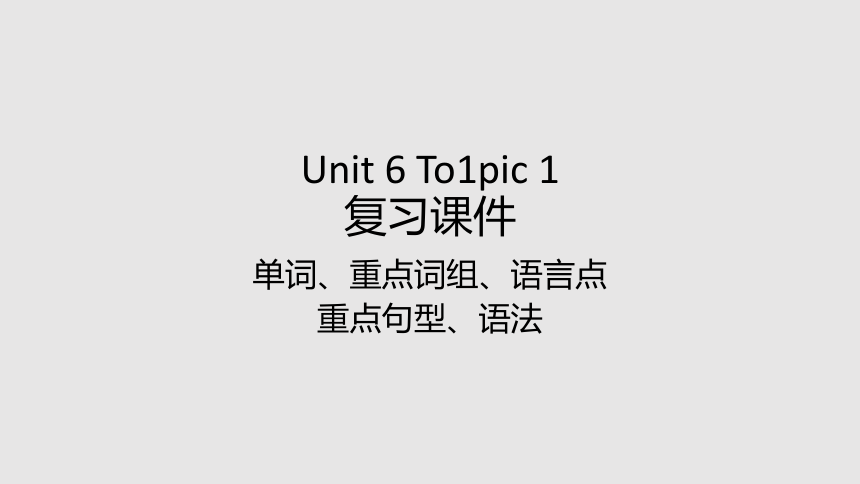 | |
| 格式 | zip | ||
| 文件大小 | 1.7MB | ||
| 资源类型 | 教案 | ||
| 版本资源 | 仁爱科普版 | ||
| 科目 | 英语 | ||
| 更新时间 | 2020-04-10 23:02:54 | ||
图片预览

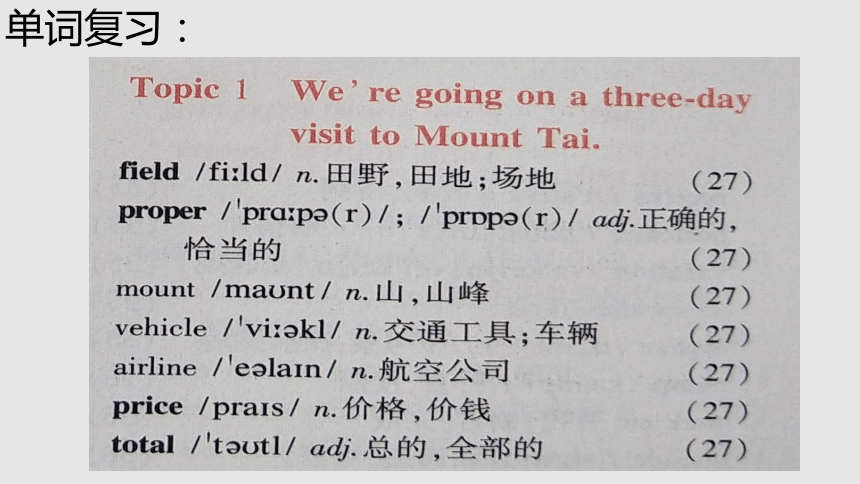
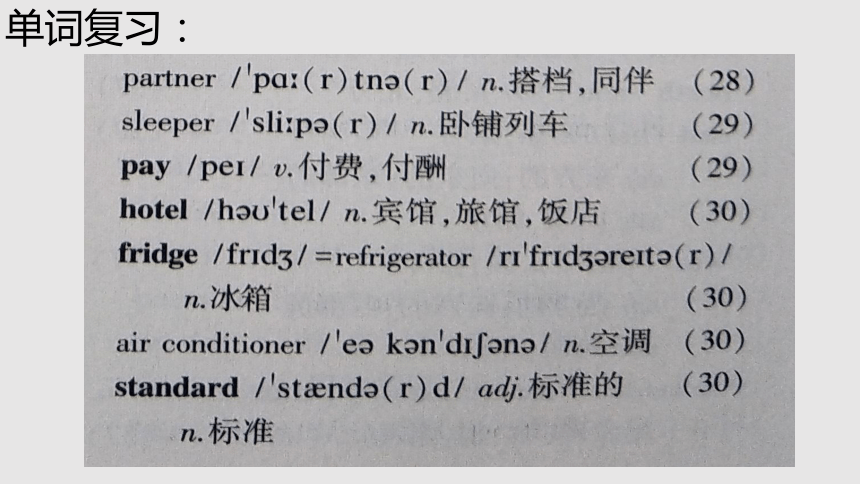
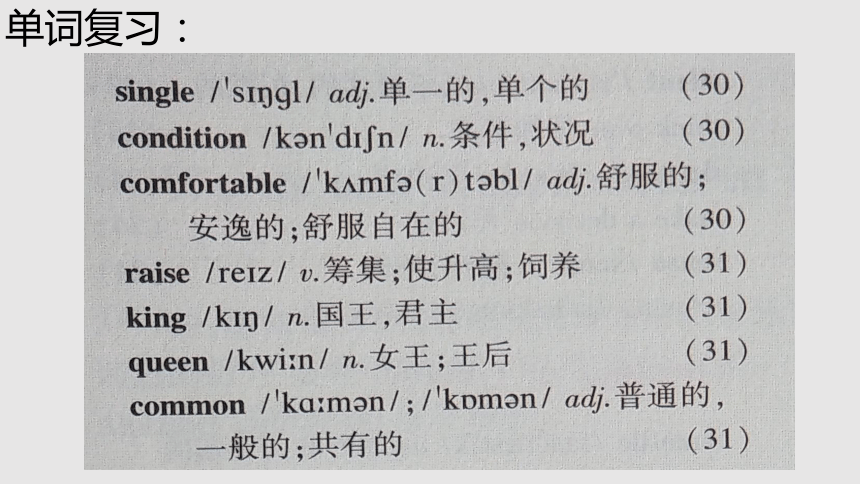
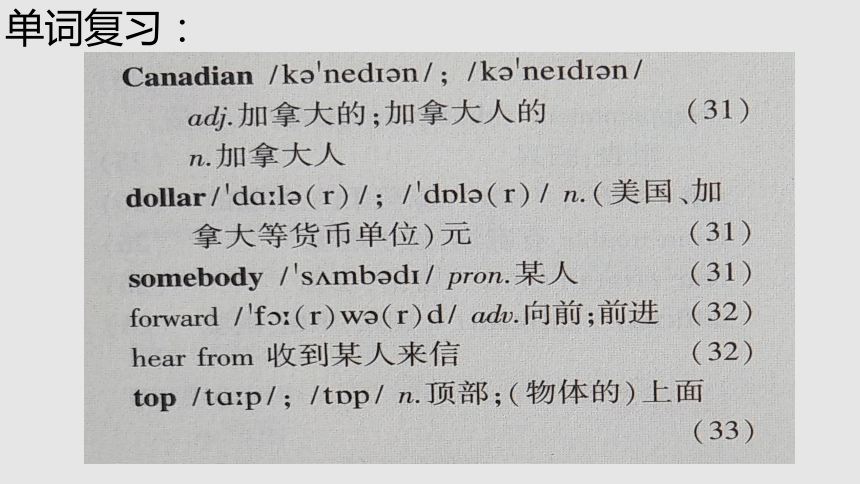
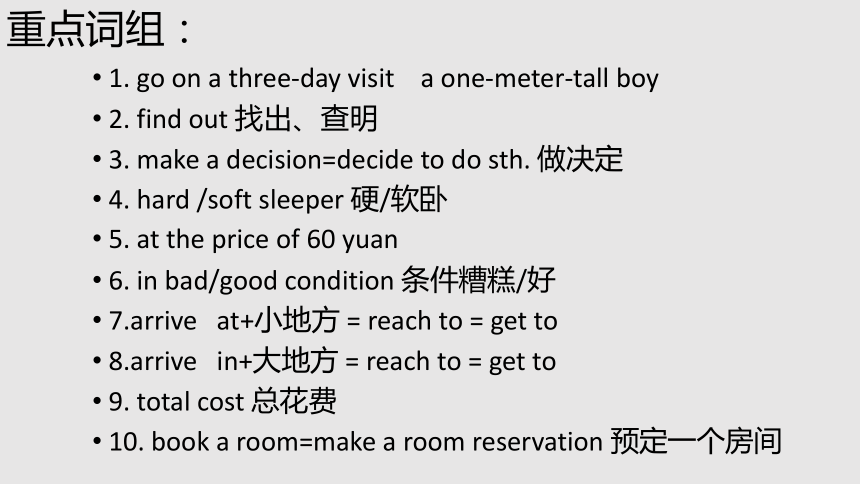
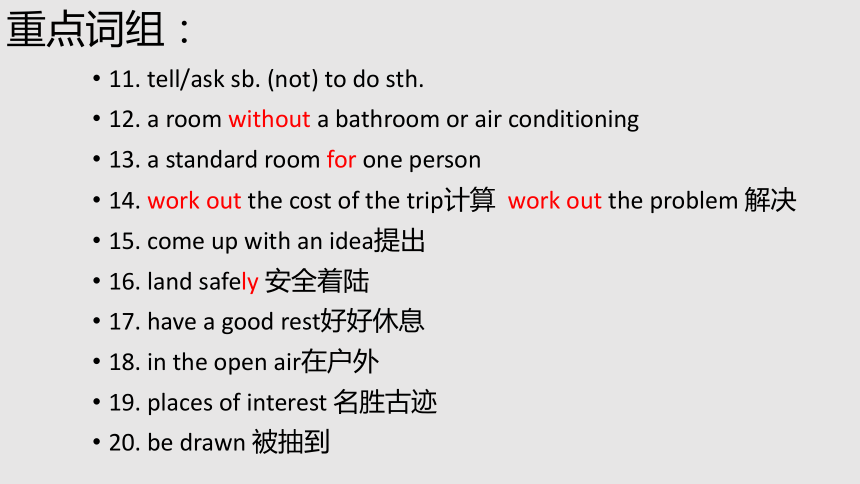
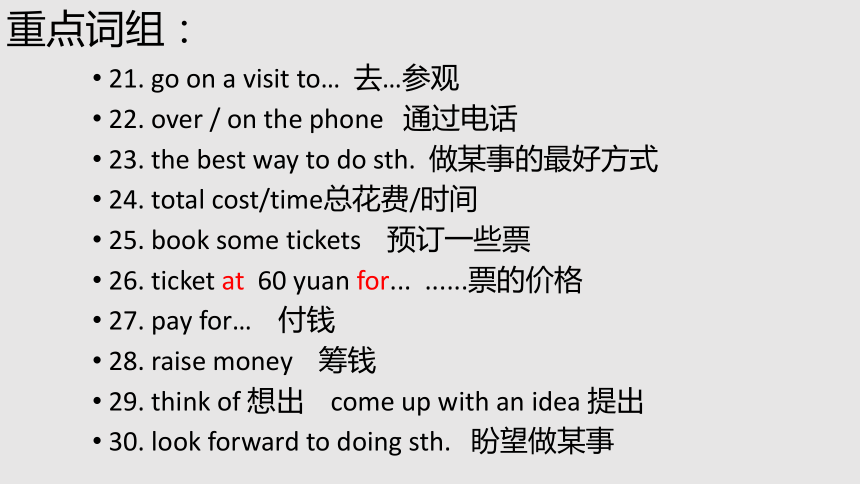
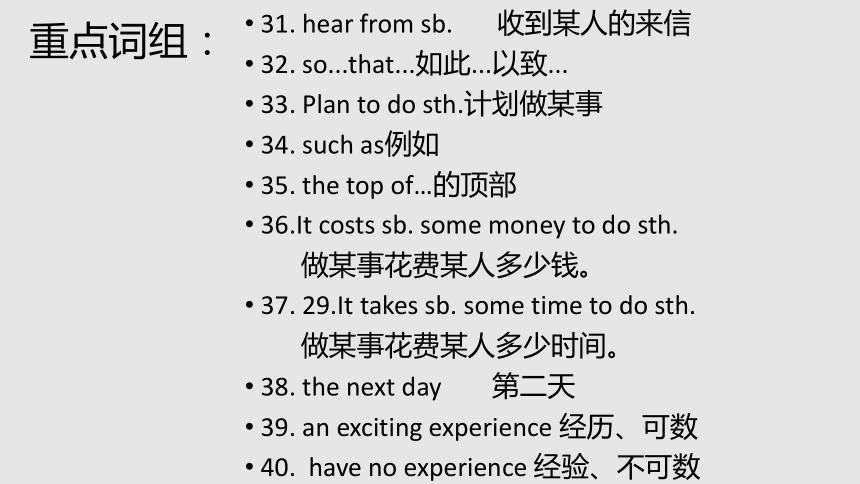
文档简介
(共23张PPT)
Unit 6 To1pic 1
复习课件
单词、重点词组、语言点
重点句型、语法
单词复习:
单词复习:
单词复习:
单词复习:
重点词组:
1. go on a three-day visit a one-meter-tall boy
2. find out 找出、查明
3. make a decision=decide to do sth. 做决定
4. hard /soft sleeper 硬/软卧
5. at the price of 60 yuan
6. in bad/good condition 条件糟糕/好
7.arrive at+小地方 = reach to = get to
8.arrive in+大地方 = reach to = get to
9. total cost 总花费
10. book a room=make a room reservation 预定一个房间
重点词组:
11. tell/ask sb. (not) to do sth.
12. a room without a bathroom or air conditioning
13. a standard room for one person
14. work out the cost of the trip计算 work out the problem 解决
15. come up with an idea提出
16. land safely 安全着陆
17. have a good rest好好休息
18. in the open air在户外
19. places of interest 名胜古迹
20. be drawn 被抽到
重点词组:
21. go on a visit to… 去…参观
22. over / on the phone 通过电话
23. the best way to do sth. 做某事的最好方式
24. total cost/time总花费/时间
25. book some tickets 预订一些票
26. ticket at 60 yuan for... ......票的价格
27. pay for… 付钱
28. raise money 筹钱
29. think of 想出 come up with an idea 提出
30. look forward to doing sth. 盼望做某事
重点词组:
31. hear from sb. 收到某人的来信
32. so...that...如此...以致...
33. Plan to do sth.计划做某事
34. such as例如
35. the top of…的顶部
36.It costs sb. some money to do sth.
做某事花费某人多少钱。
37. 29.It takes sb. some time to do sth.
做某事花费某人多少时间。
38. the next day 第二天
39. an exciting experience 经历、可数
40. have no experience 经验、不可数
语言点、重点句型:
1. I have some exciting news to tell you.我有些好消息要告诉你们。
to tell you是动词不定式,作定语,修饰news。动词不定式作定语时要放在所修饰的名词或代词之后。如:
I have nothing to say.我没什么要说的。
Could you give me something to eat?你能给我点吃的东西吗?
2.For our spring field trip, we’re going on a three-day visit to Mount Tai.
这次春游,我们将去泰山玩三天。
①go on a visit意为“去旅游”,visit作名词。如:
They will go on a visit to the West Lake this Sunday.
这个星期天他们将去西湖旅游。
语言点、重点句型:
visit探望,拜访;参观,游览。如:
I visited one of my old friends yesterday.昨天我拜访了一位老朋友。
We will visit the Great Wall next month.下个月我们将去游长城。
②a three-day visit意为“一次三天的旅游”,three-day是复合形容词,作定语,其结构为:数词+连字符+单数名词。如:
a seven-day holiday 一个七天的假期 an eight-year-old boy 一名八岁男孩
语言点、重点句型:
3. Let’s find out some information about the cost.让我们查一下有关费用的信息。
find out(通过询问、读或看等方式)查明,弄清(情况)。如:
Can you find out what time the train leaves?
你能查清楚火车什么时候开吗?
【链接】find的用法:
①(意外或偶然地)发现,碰到。如:
We found a new restaurant near our office.
我们在办公室附近发现一家新餐馆。
②(通过搜寻)找到,找回。如:
Can you find my bag for me? 你能帮我把包找到吗?
语言点、重点句型:
4. ...we’ll decide on the best way to travel on our field trip.
……我们将决定郊游的最好方式。
decide作动词,意为“决定,选定”,常用decide to do sth.意为“决定做某事”,否定形式为decide not to do sth.。decision是名词形式,常用结构为make a decision“作出决定”。如:
She decided to live in France.她决定住在法国。
They decide not to go there for their holiday.他们决定不去那儿度假。
decide on意为“决定,选定”,常用decide on sth.。如:
We are trying to decide on a job.我们正设法选定一份工作。
语言点、重点句型:
5. ..., I’d like to book some tickets to Mount Tai on April 13th.
……,我想预订四月十三日去泰山的票。
book(向旅馆、饭店、戏院等)预约,预定。如:
He booked a table for two at 8 o’clock tonight.
他预定了一张今晚八点钟的二人餐桌。
语言点、重点句型:
6. We have tickets at ? 145 for the hard sleeper and ?224 for the soft sleeper.
我们的票价是硬卧每张145元,软卧每张224元。
(1) at在句中意为“以……,在……”,一般用在表示价格、比率、年龄、速度等词的前面。如:
He was driving at 70 miles per hour.他以每小时70英里的速度驾驶。
This kind of shirt sells at ? 100.这种衬衫以100元的价格出售。
(2)hard sleeper硬卧;soft sleeper软卧。hard adj.坚硬的,坚固的。
如:That stone is so hard.那块石头真硬。
语言点、重点句型:
7. Please pay for the tickets before 5:30 p. m.请在下午5:30前结清票款。
pay v.付费,付酬。pay for...为……付钱,for后接物品。
如:How much did you pay for the book?那本书你付多少钱?
①pay的常用句型是:人+ pay +钱+ for +商品货物。如:
I will pay ?500 for the bike.我打算花500元买那辆自行车。
②pay n.工资、报酬。如:take pay 领工资;high pay 高薪。
语言点、重点句型:
8. It is very common to raise money in Canadian and American schools.
在加拿大和美国的学校里,筹钱很常见。
raise v.筹集;使升高;饲养。如:
We are raising money for charity.我们在为慈善募捐。
She raised her head and looked at me.她抬起头看着我。
My uncle raises sheep on his farm.我叔叔在他的农场养羊。
to raise money动词不定式短语在句中是真正的主语,it只是形式主语。本句是“It is +adj. +to do sth”句型,使用这种结构是为了避免“头重脚轻”。动词不定式短语在句中作主语时,谓语动词用单数。如:
To see is to believe.眼见为实。
To work hard brings success.成功源于努力。
语言点、重点句型:
【注意】to do作真正主语,it作形式主语的句型有两种形式:It’s+ for sb. to do sth.,形容词强调不定式表达的动作内容;It’s + adj. + of sb. to do sth.,形容词强调人的性格特征。如:
It’s important for us to learn English well.对我们来说学好英语非常重要。
It’s kind of you to help me. 你能帮我,真是太友好了。
9. It costs each student one dollar to buy a ticket for the draw.
每位学生只需花一美元就可买一张抽奖券。
①draw n. 抽奖,抓阄。如:
the draw for the second round of the European Cup 欧洲杯第二轮抽签
②cost意为“花费”,其主语是物。其结构为:物+cost(s)+sb.+金钱。如:
The dress costs me ? 100.这条裙子花了我100元。
语言点、重点句型:
10. I’m looking forward to hearing from you.我盼望着收到你的来信。
①look forward to意为“期待,盼望”。在这个短语中,to是介词,后面接名词或动名词。如:
I’m looking forward to seeing you again.我期待着再次见到你。
②hear from意为“收到……的来信”,后面接人,指收到某人的来信。相当于get/receive a letter from sb.。如:
I heard from my mother yesterday. = I got/received a letter from my mother yesterday. 昨天我收到了妈妈的来信。
hear of (间接地)听说。如:
I heard of him, but I didn’t know him.我听说过他,但我不认识他。
语言点、重点句型:
11. It was snowing when we got to the top.我们到达山顶时正在下雪。
top n.顶部;(物体的)上面;常用短语是:at/on the top of...在……的顶部。
如:I feared for the child when I saw him at the top of the tree.
当我看到那个小男孩在树顶上时,吓了一跳。
top adj.最高的,最优秀的。如:
She is the top student in my class.在我的班里,她是最优秀的学生。
12.I was so excited that I didn’t feel cold at all.
我那么兴奋以至于一点没感到寒冷。
so...that…如此……以至……。so为副词,修饰形容词或副词;that用来引导结果状语从句。如:
He walks so fast that I can’t catch up with him.他走那么快以至于我赶不上他。
重点语法:动词不定式
1、动词不定式的基本形式:to+动词原形,有时可以不用 to,这里的 to 是不定式符号,本身无词义,动词不定式的否定形式是 not+(to+)动词原形。
2、动词不定式的句法功能:
1) 作主语 动词不定式作主语时,常常用 it 作形式主语,而将真正的主语(动词 不定式)放在后面。 其结构为:It +be+adj.+(+for\of sb.)+动词不定式。 例句: To learn English well is useful.= It is useful to learn English well.
注意:在 kind, good, nice, clever 等表示人的品质的形容词后,不用 for 而用 of. It is clever of you to do like that.
It is very kind of you to help me.
2) 做表语 My work is to clean the room everyday.
My job is to take care of the little babies.
重点语法:
3) 作宾语 I like to play basketball. 注意:一些谓语动词后只能用动词不定式作宾语,常见的这类词表示 打算或者希望, 例如:would like, want, wish, hope, decide, plan, except 等。
I would like to see a film this evening.
I hope to become a teacher in the future. 在 find, think 等词语后,常用 it 作形式宾语,而把真正的宾语(动词 不定式)放到句末。
I find to learn English well is easy. =I find it easy to learn English well.
4) 作宾语补足语 不定式作宾语补足语时与宾语有逻辑上的主动关系。tell, ask, allow, get, encourage 等动词后常跟动词不定式作宾语补足语。
Lucy asked me to turn down the radio.
My mother encourages me to learn Japanese.
重点语法:
5) 作定语 不定式作定语应放在被修饰词后面。
There is nothing to worry about.
He was the best man to do the job.
6) 作状语 动词不定式作状语,最常考的是作目的状语。
I'm sorry to trouble you.(表原因)
I went to the library to study English.(表目的)
To find a book in the library, enter a key word into the computer.(表目的)
注意:动词不定式常和疑问词 what, which, when, where, how 连用,相当于 一个宾语从句。 The teacher is telling the students what to do.
He didn't know where to go.
Unit 6 To1pic 1
复习课件
单词、重点词组、语言点
重点句型、语法
单词复习:
单词复习:
单词复习:
单词复习:
重点词组:
1. go on a three-day visit a one-meter-tall boy
2. find out 找出、查明
3. make a decision=decide to do sth. 做决定
4. hard /soft sleeper 硬/软卧
5. at the price of 60 yuan
6. in bad/good condition 条件糟糕/好
7.arrive at+小地方 = reach to = get to
8.arrive in+大地方 = reach to = get to
9. total cost 总花费
10. book a room=make a room reservation 预定一个房间
重点词组:
11. tell/ask sb. (not) to do sth.
12. a room without a bathroom or air conditioning
13. a standard room for one person
14. work out the cost of the trip计算 work out the problem 解决
15. come up with an idea提出
16. land safely 安全着陆
17. have a good rest好好休息
18. in the open air在户外
19. places of interest 名胜古迹
20. be drawn 被抽到
重点词组:
21. go on a visit to… 去…参观
22. over / on the phone 通过电话
23. the best way to do sth. 做某事的最好方式
24. total cost/time总花费/时间
25. book some tickets 预订一些票
26. ticket at 60 yuan for... ......票的价格
27. pay for… 付钱
28. raise money 筹钱
29. think of 想出 come up with an idea 提出
30. look forward to doing sth. 盼望做某事
重点词组:
31. hear from sb. 收到某人的来信
32. so...that...如此...以致...
33. Plan to do sth.计划做某事
34. such as例如
35. the top of…的顶部
36.It costs sb. some money to do sth.
做某事花费某人多少钱。
37. 29.It takes sb. some time to do sth.
做某事花费某人多少时间。
38. the next day 第二天
39. an exciting experience 经历、可数
40. have no experience 经验、不可数
语言点、重点句型:
1. I have some exciting news to tell you.我有些好消息要告诉你们。
to tell you是动词不定式,作定语,修饰news。动词不定式作定语时要放在所修饰的名词或代词之后。如:
I have nothing to say.我没什么要说的。
Could you give me something to eat?你能给我点吃的东西吗?
2.For our spring field trip, we’re going on a three-day visit to Mount Tai.
这次春游,我们将去泰山玩三天。
①go on a visit意为“去旅游”,visit作名词。如:
They will go on a visit to the West Lake this Sunday.
这个星期天他们将去西湖旅游。
语言点、重点句型:
visit探望,拜访;参观,游览。如:
I visited one of my old friends yesterday.昨天我拜访了一位老朋友。
We will visit the Great Wall next month.下个月我们将去游长城。
②a three-day visit意为“一次三天的旅游”,three-day是复合形容词,作定语,其结构为:数词+连字符+单数名词。如:
a seven-day holiday 一个七天的假期 an eight-year-old boy 一名八岁男孩
语言点、重点句型:
3. Let’s find out some information about the cost.让我们查一下有关费用的信息。
find out(通过询问、读或看等方式)查明,弄清(情况)。如:
Can you find out what time the train leaves?
你能查清楚火车什么时候开吗?
【链接】find的用法:
①(意外或偶然地)发现,碰到。如:
We found a new restaurant near our office.
我们在办公室附近发现一家新餐馆。
②(通过搜寻)找到,找回。如:
Can you find my bag for me? 你能帮我把包找到吗?
语言点、重点句型:
4. ...we’ll decide on the best way to travel on our field trip.
……我们将决定郊游的最好方式。
decide作动词,意为“决定,选定”,常用decide to do sth.意为“决定做某事”,否定形式为decide not to do sth.。decision是名词形式,常用结构为make a decision“作出决定”。如:
She decided to live in France.她决定住在法国。
They decide not to go there for their holiday.他们决定不去那儿度假。
decide on意为“决定,选定”,常用decide on sth.。如:
We are trying to decide on a job.我们正设法选定一份工作。
语言点、重点句型:
5. ..., I’d like to book some tickets to Mount Tai on April 13th.
……,我想预订四月十三日去泰山的票。
book(向旅馆、饭店、戏院等)预约,预定。如:
He booked a table for two at 8 o’clock tonight.
他预定了一张今晚八点钟的二人餐桌。
语言点、重点句型:
6. We have tickets at ? 145 for the hard sleeper and ?224 for the soft sleeper.
我们的票价是硬卧每张145元,软卧每张224元。
(1) at在句中意为“以……,在……”,一般用在表示价格、比率、年龄、速度等词的前面。如:
He was driving at 70 miles per hour.他以每小时70英里的速度驾驶。
This kind of shirt sells at ? 100.这种衬衫以100元的价格出售。
(2)hard sleeper硬卧;soft sleeper软卧。hard adj.坚硬的,坚固的。
如:That stone is so hard.那块石头真硬。
语言点、重点句型:
7. Please pay for the tickets before 5:30 p. m.请在下午5:30前结清票款。
pay v.付费,付酬。pay for...为……付钱,for后接物品。
如:How much did you pay for the book?那本书你付多少钱?
①pay的常用句型是:人+ pay +钱+ for +商品货物。如:
I will pay ?500 for the bike.我打算花500元买那辆自行车。
②pay n.工资、报酬。如:take pay 领工资;high pay 高薪。
语言点、重点句型:
8. It is very common to raise money in Canadian and American schools.
在加拿大和美国的学校里,筹钱很常见。
raise v.筹集;使升高;饲养。如:
We are raising money for charity.我们在为慈善募捐。
She raised her head and looked at me.她抬起头看着我。
My uncle raises sheep on his farm.我叔叔在他的农场养羊。
to raise money动词不定式短语在句中是真正的主语,it只是形式主语。本句是“It is +adj. +to do sth”句型,使用这种结构是为了避免“头重脚轻”。动词不定式短语在句中作主语时,谓语动词用单数。如:
To see is to believe.眼见为实。
To work hard brings success.成功源于努力。
语言点、重点句型:
【注意】to do作真正主语,it作形式主语的句型有两种形式:It’s+ for sb. to do sth.,形容词强调不定式表达的动作内容;It’s + adj. + of sb. to do sth.,形容词强调人的性格特征。如:
It’s important for us to learn English well.对我们来说学好英语非常重要。
It’s kind of you to help me. 你能帮我,真是太友好了。
9. It costs each student one dollar to buy a ticket for the draw.
每位学生只需花一美元就可买一张抽奖券。
①draw n. 抽奖,抓阄。如:
the draw for the second round of the European Cup 欧洲杯第二轮抽签
②cost意为“花费”,其主语是物。其结构为:物+cost(s)+sb.+金钱。如:
The dress costs me ? 100.这条裙子花了我100元。
语言点、重点句型:
10. I’m looking forward to hearing from you.我盼望着收到你的来信。
①look forward to意为“期待,盼望”。在这个短语中,to是介词,后面接名词或动名词。如:
I’m looking forward to seeing you again.我期待着再次见到你。
②hear from意为“收到……的来信”,后面接人,指收到某人的来信。相当于get/receive a letter from sb.。如:
I heard from my mother yesterday. = I got/received a letter from my mother yesterday. 昨天我收到了妈妈的来信。
hear of (间接地)听说。如:
I heard of him, but I didn’t know him.我听说过他,但我不认识他。
语言点、重点句型:
11. It was snowing when we got to the top.我们到达山顶时正在下雪。
top n.顶部;(物体的)上面;常用短语是:at/on the top of...在……的顶部。
如:I feared for the child when I saw him at the top of the tree.
当我看到那个小男孩在树顶上时,吓了一跳。
top adj.最高的,最优秀的。如:
She is the top student in my class.在我的班里,她是最优秀的学生。
12.I was so excited that I didn’t feel cold at all.
我那么兴奋以至于一点没感到寒冷。
so...that…如此……以至……。so为副词,修饰形容词或副词;that用来引导结果状语从句。如:
He walks so fast that I can’t catch up with him.他走那么快以至于我赶不上他。
重点语法:动词不定式
1、动词不定式的基本形式:to+动词原形,有时可以不用 to,这里的 to 是不定式符号,本身无词义,动词不定式的否定形式是 not+(to+)动词原形。
2、动词不定式的句法功能:
1) 作主语 动词不定式作主语时,常常用 it 作形式主语,而将真正的主语(动词 不定式)放在后面。 其结构为:It +be+adj.+(+for\of sb.)+动词不定式。 例句: To learn English well is useful.= It is useful to learn English well.
注意:在 kind, good, nice, clever 等表示人的品质的形容词后,不用 for 而用 of. It is clever of you to do like that.
It is very kind of you to help me.
2) 做表语 My work is to clean the room everyday.
My job is to take care of the little babies.
重点语法:
3) 作宾语 I like to play basketball. 注意:一些谓语动词后只能用动词不定式作宾语,常见的这类词表示 打算或者希望, 例如:would like, want, wish, hope, decide, plan, except 等。
I would like to see a film this evening.
I hope to become a teacher in the future. 在 find, think 等词语后,常用 it 作形式宾语,而把真正的宾语(动词 不定式)放到句末。
I find to learn English well is easy. =I find it easy to learn English well.
4) 作宾语补足语 不定式作宾语补足语时与宾语有逻辑上的主动关系。tell, ask, allow, get, encourage 等动词后常跟动词不定式作宾语补足语。
Lucy asked me to turn down the radio.
My mother encourages me to learn Japanese.
重点语法:
5) 作定语 不定式作定语应放在被修饰词后面。
There is nothing to worry about.
He was the best man to do the job.
6) 作状语 动词不定式作状语,最常考的是作目的状语。
I'm sorry to trouble you.(表原因)
I went to the library to study English.(表目的)
To find a book in the library, enter a key word into the computer.(表目的)
注意:动词不定式常和疑问词 what, which, when, where, how 连用,相当于 一个宾语从句。 The teacher is telling the students what to do.
He didn't know where to go.
同课章节目录
- Unit 5 Feeling excited
- Topic 1 You look excited
- Topic 2 I’m feeling better now.
- Topic 3 Many things can affect our feelings.
- Unit 6 Enjoying Cycling
- Topic 1 We're going on a three-day visit to Mount
- Topic 2 How about exploring Tian’anmen Square?
- Topic 3 Bicycle riding is good exercise.
- Unit 7 Food festival
- Topic 1 We’re preparing for a food festival.
- Topic 2 I’m not sure whether I can cook it well.
- Topic 3 I Cooked the Most Successfully
- Unit 8 Our Clothes
- Topic 1 We will have a class fashion show.
- Topic 2 We can design our own uniforms.
- Topic 3 He said the fashion show was wonderful.
